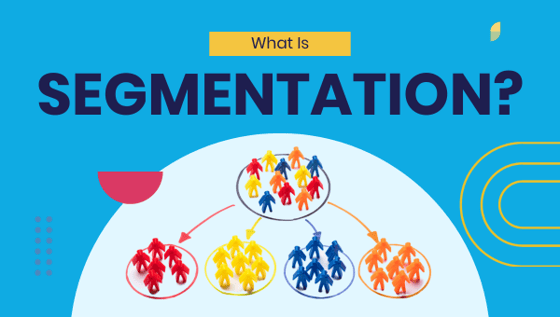






Before you can launch any inbound marketing campaigns, you must first ensure your inbound marketing strategy clearly indicates who your segmented audience group is. These are not just the audience groups that your company wants to target, but rather the ones that you should target. This crucial step is rooted in deep research, understanding, and analysis, and it forms the strategic backbone of everything you do.
The Definition of Market Segmentation
Market segmentation is the crucial process of dividing the total market for a good or service into several segments, each of which needs to be internally homogeneous (the same) but externally heterogeneous (different) from all others.
Segmentation is not just about categorising customers based on their basic demographics but goes deeper into understanding their psychographics, behaviors, and buying patterns.
By breaking down the total addressable market into manageable chunks, businesses can gain valuable insights into the diverse needs and preferences of their target audience.
Segmentation allows businesses to uncover the distinct characteristics of each segment, enabling them to tailor their marketing strategies and messages to resonate with the specific needs and desires of each group. It's not enough to have a general understanding of the market; businesses need to delve into the intricacies of their customers' thoughts, actions, emotions, and purchasing habits. This level of understanding empowers businesses to deliver the right message to the right people at the right time, increasing their chances of success.
Moreover, segmentation plays a vital role in planning the potential profitability of each customer group. By identifying and analysing the different segments, businesses can prioritise their resources and make informed strategic decisions about where to invest their time, money, and energy. Not all customers contribute equally to a company's sales, and by focusing on the most valuable segments, businesses can optimise their efforts and maximise their results.
The Importance of Segmentation
Segmentation is a crucial aspect of inbound marketing that should not be overlooked. By dividing the total market into distinct segments, businesses can better understand their customers and tailor their marketing efforts accordingly.
This process involves identifying groups of individuals who share similar characteristics, such as demographics, behaviours, or preferences.
#1 Become Market Oriented
One of the main reasons why segmentation is important is because it aligns with a market-oriented approach. Being market-oriented means truly understanding the diverse groups that make up your potential market. By doing so, you can deliver the right message to the right people at the right time, ultimately increasing your chances of selling more. This targeted approach allows businesses to focus their efforts on meeting the specific needs and wants of each segment, rather than trying to appeal to a broad and generic audience.
#2 Avoid the Dangerous "Average"
Another benefit of segmentation is that it helps businesses avoid the dangerous trap of the "average." When marketing efforts are not tailored to specific segments, there is a risk of averaging out different attitudes and preferences into a single unhelpful mess. By understanding the unique needs and wants of each segment, businesses can create more personalised and effective marketing campaigns that resonate with their target audience.
#3 Allocate GTM Resources Effectively
Segmentation also allows businesses to focus their resources more effectively. Not all customers contribute equally to a company's sales. In fact, it is often the case that a small percentage of customers generate the majority of sales. By identifying these valuable customers, businesses can allocate their resources strategically and maximise their results. This may involve tailoring marketing efforts specifically towards these high-value customers or developing initiatives to retain their loyalty.
Segmentation is crucial for businesses to successfully navigate the ever-changing market landscape. By understanding the distinct segments within their market, businesses can deliver targeted messages, avoid the dangers of averaging, and allocate their resources effectively.
Ultimately, segmentation enables businesses to make stronger strategic decisions and achieve greater profitability. So, if you want to stay ahead in the competitive market, make sure segmentation is at the forefront of your marketing strategy.
How to Segment your Total Addressable Market
The key to effective segmentation is first deciding on the variables your business needs to understand to identify distinctive, self-contained segments with unique needs and behaviours.
For example, if you sell Accounting software, then knowing if buyers are male or female is arguably unhelpful.
Better variables would be:
- Company size - Impacts potential number of licences
- Location - You may only have sales reps in London
- Current Supplier - You may want to target a specific market share
Once you have segments identified, you can then qualify the segment based on:
- Budget
- Access to decision makers
- Need for services
- Buying Process
- Additional factors
Segmentation and Targeting
Targeting is deciding on who you WILL and WON’T actively target in your category.
It’s about first understanding the market, then choosing where to play.
Strong targeting comes from a deep understanding of your market, competition, and operational capabilities.
Effective targeting means being able to answer these three questions:
- Is this segment big enough to service?
- Do we have the operational functionality to sell to the segment?
- Is this segment a fundamentally good fit for our product?
How to Identify Your Target Audience
For a segment to be considered a target, you must be able to answer YES to all three questions.
- Is the segment big enough to service?
- Can we sell to the segment?
- Is this segment a good fit for our product?
Segmentation is crucial for businesses to understand their customers and tailor their marketing efforts accordingly. By dividing the total market into distinct segments based on demographics, behaviors, and preferences, businesses can deliver targeted messages and avoid the dangers of averaging. This allows businesses to allocate their resources effectively and make stronger strategic decisions for greater profitability. Segmentation should be at the forefront of every marketing strategy to stay ahead in the competitive market.








